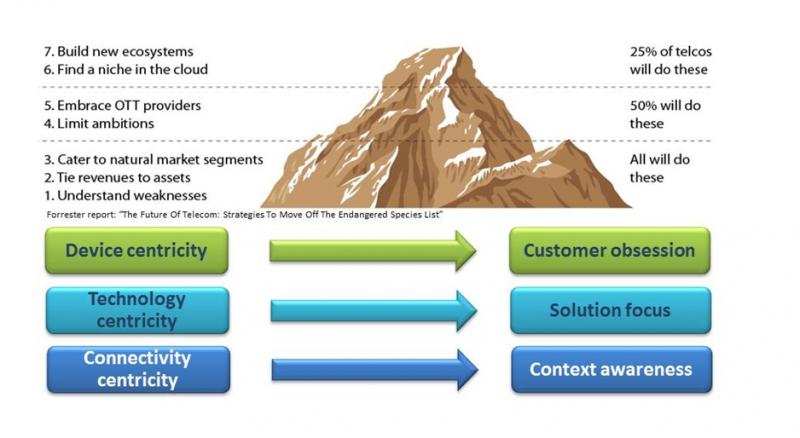The Future Of Telcos Remains Precarious

The old telco business model is breaking up. Telcos are at a crossroads, with one path leading to becoming pure utilities, another to transforming into important members of digital ecosystems, and a third to their complete demise.
Telcos have had years to prepare for this situation, but few have used their time effectively. At this stage, I see few reasons to be optimistic about the prospects for most telcos to recover the ground they’ve lost to other players in the emerging digital ecosystems because:
- Consumers care more about apps and devices than connectivity than ever.One main impact of the onslaught on telcos by over-the-top providers like Facebook and handset manufacturers like Apple has been to push telco brands to the back of the consumer’s mind. Consumers care more about which handset and apps they use than which connectivity provider they have. Telco brands just don’t rock as they used to years ago.
- Business leaders do not see telcos as the first choice to provide ICT services.Data from Forrester’s Global Business Technographics® Networks And Telecommunications Survey 2015 shows that business and IT users trust systems integrators and independent solution specialists more than telcos with a wide spectrum of voice, data, and managed services. One of the reasons is that business and IT users feel that telcos don’t understand their specific business requirements sufficiently.
- Regulators undermine telcos from adopting new connectivity business models.As part of the net neutrality debate regulatory bodies oppose various telcos’ attempts to explore commercial relationships with content and service providers regarding the delivery of content via prioritized connectivity. At the same time, regulators refrain from applying the same regulation for over-the-top communication services as for telcos. This limits the telcos’ digital transformation process.
During the past 15 years the vast majority of telcos have muddled through an ever-faster-changing ICT environment. A mix of arrogance, complacency, and incompetence in reacting to emerging threats from non-telcos has put telcos on the back foot. To get out of this position, telcos must:
- Turn customer service into the top board-level priority.Telcos need to move customer experience and engagement initiatives centre-stage. An outside-in perspective, i.e. looking through the eyes of their customers rather than taking their usual network management view, is critical as part of this endeavour. T-Mobile US is a good example that demonstrates that telcos can achieve this goal. Amazon remains a consumer benchmark for customer service, while Salesforce is fast developing into a benchmark for business customer engagement. Moreover, for a true end-to-end customer experience telcos need to embrace a network-agnostic approach to customer service, as customer experience doesn’t stop once their customer starts roaming on another telco’s network when traveling.
- Build new channel partner relationships to deliver digital solutions.Telcos have opportunities to engage with over-the-top players, content and app providers, as well as software firms around embedded connectivity. For instance, any connected device, content, or software could be sold to customers with “connectivity included.” In this context, the Internet of Things should be seen as a particular opportunity for telcos. Such embedded connectivity offerings require a complete transformation of the telco wholesale model.
- Rediscover connectivity as their most valuable cash-generating asset.Telcos should run their network operation as a separate entity. At this stage, the network remains the only true cash cow for telcos. Hence, telcos must upgrade their network to a software-defined network architecture to support broadband hyper-connectivity and agile service delivery. An agile, all-IP network infrastructure is key to: a) rolling out and delivering services to customers quickly; b) using network-based sensors to gather relevant usage data effectively; and c) providing the basis for telcos to become a trusted source of secure end-to-end network-based cloud services.
But the biggest obstacle to true telco renewal remains telcos’ complacent and conservative culture. Telcos must break with their conservative nature, bring in new talent and embrace a more agile and open operating culture that values faster and less perfect innovation cycles; pushes flatter hierarchies; and gives more decision-making power to customer-facing employees. The alternative means that telcos will fail to play a central role in the emerging digital ecosystems and will continue their gradual decline.
